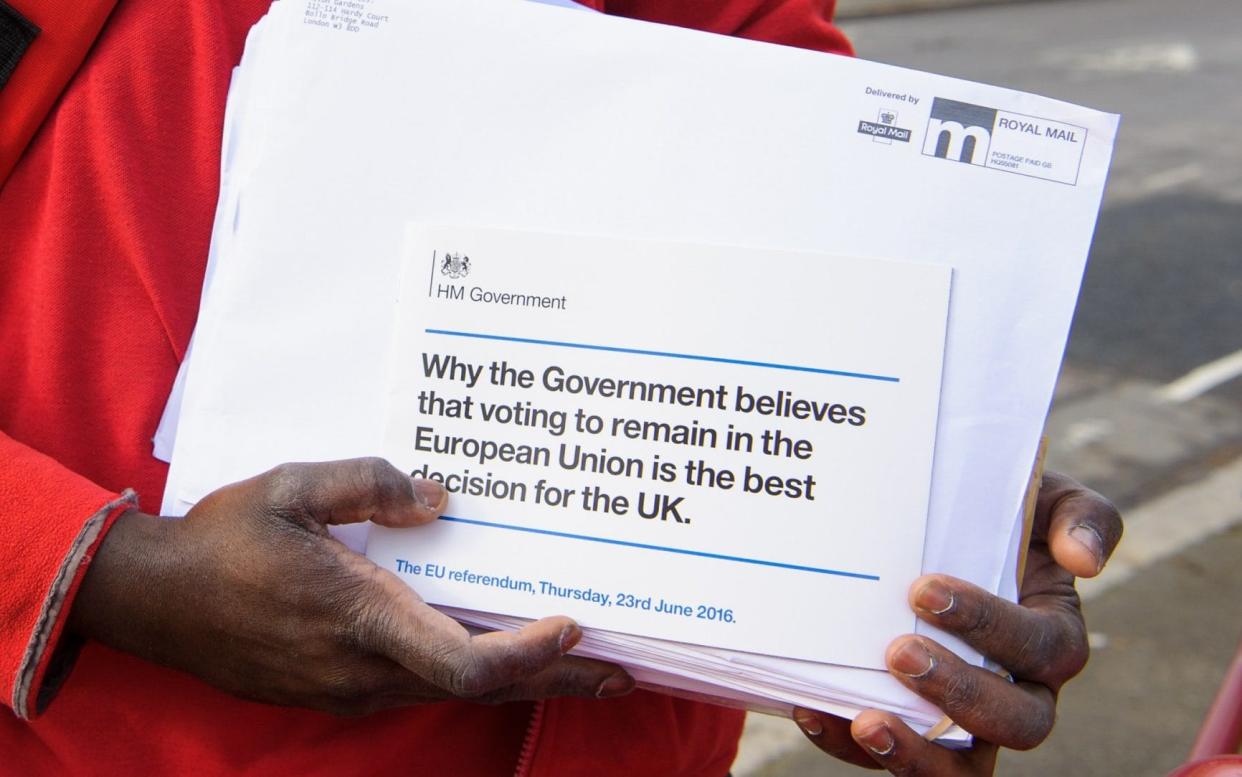Government's pro-EU publicity blitz gave Remain an unfair advantage in the referendum, report suggests

A £9.3m pro-EU publicity blitz by David Cameron's government in the run-up to the Brexit referendum gave the Remain side an unfair advantage, the like of which should be outlawed in future votes, an independent commission has suggested.
In a major report, a cross-party panel called for a significant extension of restrictions banning ministers from using unlimited amounts of public money in favour of one side of a debate before the final month of a campaign. The Independent Commission on Referendums, whose members include Dominic Grieve, the pro-Remain former attorney general, and Gisela Stuart, who co-chaired the official Leave campaign, also recommended that the elections watchdog should be able to seek a court injunction stopping the distribution of any material that would fall foul of the new rules.
Mr Cameron was heavily criticised by pro-Brexit campaigners in April 2016 when his government issued a leaflet to all households setting out why remaining in the EU was the "best decision" for the country.
In its report, which will be discussed by the Commons public administration committee on Tuesday, the commission states: "Less than three months before the EU referendum, the UK government spent £9.3 million of public funds distributing a leaflet entitled ‘Why the government believes that voting to remain in the EU is the best decision for the UK’, the purpose of which, it claimed, was ‘to help the public make an informed decision in the upcoming EU referendum’."

The panel, which was set up by University College London's Constitution Unit, added: "The Commission is concerned that the current restrictions on government during referendum campaigns permit potentially unlimited spending of public money in favour of one side of the debate before the final four weeks of the campaign."
Currently, under section 125 of the Political Parties, Elections and Referendums Act 2000, Government departments and local authorities are subject to tight restrictions on their activities in the run-up to a referendum. However those restrictions only apply to the last 28 days of a campaign - known as "purdah" - and the panel noted that the Brexit leaflet was distributed "just before" that period.
"To address this problem, the Commission recommends extending section 125 restrictions so that they come into force at the beginning of the regulated referendum period," the report states.
The report also recommended that the Electoral Commission should be given "the power to seek an injunction to stop any activity in breach of section 125.
"This would stop such activity during the course of the campaign itself, rather than relying on punitive action taken retrospectively," they added.

The proposals are among a series of recommendations in the 224-page report, which was published this month. The report calls for wholesale reform of the referendum process, including a requirement for governments to undertake "significant preparatory work" before holding a vote.
Earlier this week the Electoral Commission ruled that Vote Leave, the official pro-Brexit campaign, broke electoral law during the EU referendum by exceeding its legal spending limit of £7m by almost £500,000, through joint working with BeLeave, another campaign group.
Vote Leave said the Electoral Commission's report contained a number of "incorrect assertions that are wholly inaccurate and do not stand up to scrutiny" and said it was “confident that these findings will be overturned”.
The findings of the UCL commission in relation to Government spending will bolster the claims of Brexiteers that they were significantly outgunned by pro-Remain spending as a result of the government leaflets.
The panel was chaired by Sir Joseph Pilling, a former senior civil servant. Other members included Jenny Watson, who was chairman of the Electoral Commission during the referendum campaign, Dame Cheryl Gillan, the former Conservative cabinet minister, Seema Malhotra, a Labour member of the Commons Brexit committee, and David Runciman, a professor of politics at Cambridge University.


 Yahoo News
Yahoo News 
